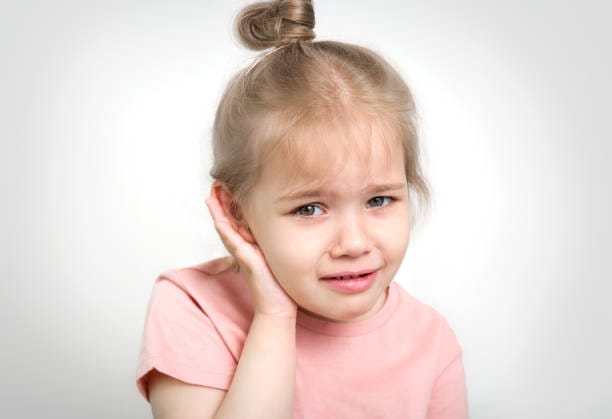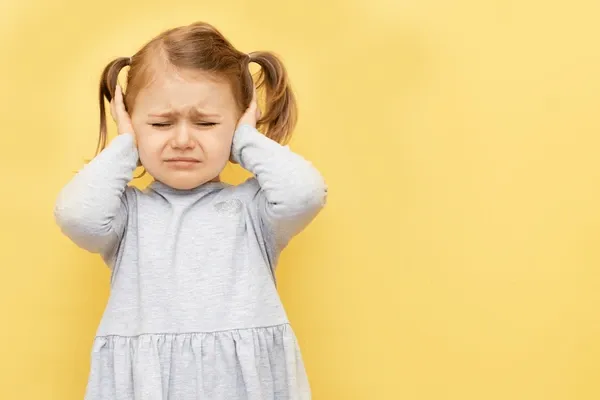How to Treat Earache in Kids at Home? Agewise Treatment Options!
Earache Rescue 101: Learn How to Treat Your Kid's Ear Pain at Home. Empower Yourself with Practical Tips and Gentle Remedies, Unveiling the Secrets of Easing Ear Discomfort in Children. From Olive Oil Drops to Cozy Warmth, Embrace the Toolbox of Home Care for Happy Ears! 🛠️👧👂

Earaches in children can be distressing for both the little ones and their parents. It's crucial to approach the treatment with consideration of the child's age, as different age groups may require distinct approaches to alleviate the pain and discomfort associated with earaches.
Earaches are a common ailment in children, often causing discomfort and anxiety. Understanding how to address these issues at home becomes crucial for parents. This article will guide you through age-specific treatment strategies for treating earaches in kids effectively.
Before delving into treatment methods, it's essential to understand the causes and symptoms of earaches in children. Common causes include ear infections, teething, sinus infections, and colds. Signs such as ear pulling, irritability, and difficulty sleeping may indicate an earache.
Age-wise Treatment Approaches

Here are some general suggestions for treating earaches in children at home. It's important to consult with a healthcare professional for advice tailored to your child's specific situation. Here are some age-specific recommendations:
Infants (0-12 months):
- Breastfeeding or Bottle-Feeding: If your baby is still breastfeeding or bottle-feeding, offer them the breast or bottle more frequently. The sucking motion may help alleviate ear pain.
- Comfort Measures: Hold and comfort your baby, providing a calm and soothing environment.
- Keep Upright: When putting your baby to sleep, try to position them so that the affected ear is slightly elevated.
Toddlers (1-3 years):
- Pain Relievers: Consult with your doctor about appropriate pain relievers like acetaminophen or ibuprofen. Follow the recommended dosage for your child's age and weight.
- Warm Compress: Apply a warm compress to the affected ear for about 15 minutes, several times a day.
- Hydration: Ensure your child stays well-hydrated as this can help prevent further infections.
Preschoolers (3-6 years):
- Pain Medications: Use over-the-counter pain relievers like acetaminophen or ibuprofen, following proper dosage instructions.
- Warm Olive Oil Drops: Putting a few warm drops of olive oil in the affected ear may provide relief.
- Rest: Encourage rest to help the body recover.
School-Age Children (6-12 years):
- Pain Management: Continue with age-appropriate pain relievers as recommended by a healthcare professional.
- Warm Compress: Apply a warm compress to the ear for 15-20 minutes, multiple times a day.
- Ear Drops: Use over-the-counter ear drops after consulting with a healthcare provider.
Pre-teens and Teenagers (13-18 years):
It's important to communicate with the teenager about their symptoms and encourage them to seek help if the earache persists or if there are any signs of infection. You can use the same treatment as for School-Age Children (6-12 years) and follow one more tip:
- Humidifier: If the earache is associated with congestion or a cold, using a humidifier in the bedroom can help keep the air moist.
Remember, these are general guidelines, and it's crucial to consult with a healthcare provider for advice tailored to your child's specific situation. If your child is experiencing severe or persistent pain, seek medical attention promptly.
Home Remedies for Earaches
Here are some home remedies for earache that has significant impact on earache:
- Olive Oil Drops: Administer a few warm drops of olive oil into the ear to help soften earwax if it's contributing to the earache.
- Onion Poultice: Warm a small piece of onion, wrap it in a cloth, and place it against the ear for relief. Onions have natural anti-inflammatory properties.
- Garlic Oil: Use warm garlic oil drops in the ear. Garlic has mild antibacterial properties.
- Elevation: Prop up the child's head with an extra pillow while sleeping to encourage drainage.
- Over-the-Counter Pain Relievers: Consult with a healthcare professional for appropriate dosage of children's ibuprofen or acetaminophen.
- Chewing or Yawning: Encourage gentle chewing or yawning to help equalize ear pressure.
- Hydration: Keep the child well-hydrated by offering water and clear fluids.
- Rest: Ensure the child gets plenty of rest to support the healing process.
Preventive Measures for Children:
- Ear Hygiene: Teach children to clean their ears gently, avoiding the use of cotton swabs inside the ear canal.
- Avoid Smoke Exposure: Limit exposure to cigarette smoke and other environmental irritants.
- Ear Protection: Use earplugs or earmuffs in noisy environments to prevent potential damage.
- Dry Ears Thoroughly: After swimming or bathing, make sure to dry the ears carefully to prevent moisture-related issues.
- Regular Check-ups: Schedule routine check-ups with a healthcare professional to monitor ear health.
- Prompt Treatment of Infections: Address respiratory infections promptly to reduce the risk of ear infections.
- Balanced Diet: Promote a balanced diet rich in vitamins and minerals to support overall immune system health.
- Avoid Water Entry: Use earplugs or a swim cap to prevent water from entering the ears during water activities.
- Teach Healthy Habits: Educate children about the importance of handwashing to prevent the spread of germs.
- Vaccinations: Ensure that children are up-to-date on vaccinations, as some preventable diseases can lead to ear infections.
If a child's earache persists, worsens, or is accompanied by other concerning symptoms, seek advice from a healthcare professional for proper diagnosis and treatment. Home remedies and preventive measures are supportive but should not replace professional medical guidance.
Common Mistakes to Avoid
- Inserting Objects into the Ear: Avoid using cotton swabs or any other objects to clean the ear canal, as it can push wax deeper or cause injury.
- Delaying Professional Help: If an earache persists, worsens, or is accompanied by severe symptoms, avoid delaying professional medical consultation.
- Self-Diagnosis: Avoid self-diagnosing the cause of an earache. Seek professional guidance for an accurate diagnosis.
- Overuse of Over-the-Counter Drops: Avoid overusing over-the-counter ear drops without professional advice, as improper use may exacerbate the issue.
- Ignoring Ear Infections: Neglecting ear infections can lead to complications. Seek timely medical attention.
- Ignoring Allergies: Allergies can contribute to ear issues. Don't ignore allergy symptoms; manage them appropriately.
- Incomplete Antibiotic Courses: If prescribed antibiotics, complete the full course to prevent antibiotic resistance.
- Excessive Noise Exposure: Limit exposure to loud noises, as it can contribute to hearing problems and ear discomfort.
The Role of Diet in Earache Prevention
- Maintain a Balanced Diet: Consume a diet rich in fruits, vegetables, whole grains, and lean proteins to support overall health, including the immune system.
- Include Omega-3 Fatty Acids: Include sources of omega-3 fatty acids, such as fish, flaxseeds, and walnuts, which may have anti-inflammatory properties.
- Stay Hydrated: Proper hydration supports mucous membrane health and can help prevent ear-related issues.
- Limit Sugary and Processed Foods: Reduce intake of sugary and processed foods, as they may contribute to inflammation and weaken the immune system.
- Manage Food Allergies: If the individual has known food allergies, manage them carefully to prevent allergic reactions that could affect the ears.
- Consider Probiotics: Probiotics found in yogurt or supplements may promote a healthy balance of bacteria in the body, potentially supporting immune function.
Remember, while a healthy diet plays a role in overall well-being, it should be part of a comprehensive approach to earache prevention, including good hygiene practices and prompt medical attention when needed.
Creating a Comfortable Environment:
- Maintain a Calm Atmosphere: Create a quiet and peaceful environment to help the child relax and rest.
- Use Soft Lighting: Use soft, dim lighting in the room to reduce discomfort, especially during nighttime.
- Provide Comfort Items: Offer comforting items such as a favourite blanket or stuffed animal to provide a sense of security.
- Adjust Room Temperature: Ensure the room is at a comfortable temperature, neither too hot nor too cold.
- Encourage Quiet Activities: Engage the child in quiet and calming activities such as reading a book or listening to soothing music.
- Offer Distraction: Provide distractions like a gentle movie or audiobook to divert the child's attention from the earache.
Conclusion:
In treating earaches in kids at home, a combination of home remedies, preventive measures, and creating a comfortable environment plays a crucial role. From warm compresses and natural remedies to maintaining good ear hygiene and a healthy diet, these approaches contribute to the overall well-being of children.
Note that, while home remedies are supportive, professional medical advice should be sought if the earache persists or worsens. Timely consultation with a healthcare professional ensures accurate diagnosis and appropriate treatment.
FAQs about Treating Earache in Kids at Home:
Q1: Can I use over-the-counter drops for my child's earache?
- A1: Consult with a healthcare professional before using any over-the-counter drops, as they may not be suitable for all cases.
Q2: Is it safe to apply a warm compress for an extended period?
- A2: Limit warm compress application to 15-20 minutes at a time to prevent burns. Consult a healthcare professional if unsure.
Q3: Can I use natural remedies for infants with earaches?
- A3: Some natural remedies, like warm compresses, may be suitable for infants. However, always consult with a healthcare professional for guidance.
Q4: When should I seek medical attention for my child's earache?
- A4: Seek medical attention if the earache persists, worsens, or is accompanied by symptoms such as fever, discharge, or hearing loss.
Q5: How can I prevent earaches in my child?
- A5: Encourage good ear hygiene, address allergies promptly, and ensure your child stays well-hydrated. Regular check-ups with a healthcare professional also contribute to preventive care.



